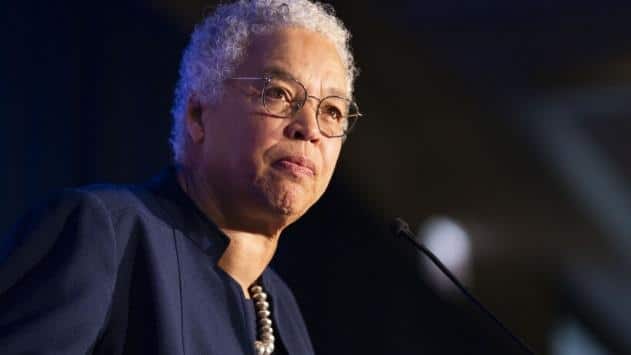
Headlines from abortion rights supporters and policymakers
Image: Cook County Illinois Board President Toni Preckwinkle
California prepares to fortify state’s abortion access: ‘Fight for what’s right’.
Guardian, by Sam Levin, 22 November 2024
Woman challenging Kentucky abortion ban has ended her pregnancy (with an out-of-state abortion) but not the legal challenge.
Kentucky Lantern, by Sarah Ladd, 20 November 2024
Oregon restocks 3-year supply of mifepristone to last through 2028.
The Oregonian/OregonLive, by Kristine de Leon, 21 November 2024
Illinois: Cook County Board unanimously approved nearly $10 billion budget for 2025, including more money for reproductive health services.
WBEZ Chicago (National Public Radio), by Kristen Schorsch, 21 November 2024. ; PHOTO above: by Pat Nabong, Sun-Times, 22 August 2024.
Texas’ biggest anti-abortion organization is recruiting men to sue female partners over abortions the women had [Ahem, that is men who are ex-partners to be exact]
Jezebel.com, by Kylie Cheung, 22 November 2024
+++
Miscarrying patient was passed around ‘like a hot potato’ due to Idaho abortion ban, doctor testifies
Several women are challenging the strict abortion ban in Idaho. A woman experiencing dangerous bleeding was not admitted by doctors at an Idaho hospital until her fourth emergency room visit in one week, due to fear and confusion over the state’s abortion ban, an Idaho doctor said in testimony on Tuesday.
The “heavily bleeding” patient was told the pregnancy would not survive, but she had not been counseled on abortion, Dr Julie Lyons, a family physician in Idaho and plaintiff in a lawsuit over the state’s abortion bans, said on the stand.
SOURCE: ABC News, by Nadine El-Bawab, 20 November 2024
+++
Abortion laws may impact where oncologists choose to practice
Fellows who had experience with abortion restrictions disrupting cancer care during their training were more likely to consider abortion laws when deciding where to practice.
One in three oncology fellows surveyed said abortion restrictions have a negative impact on cancer care, and more than half of fellows said they are likely to consider the impact of abortion restrictions on care when deciding where to practice.
These results “provide early insights into the impact of abortion restrictions on quality of cancer care” and suggest that abortion restrictions may impact “the geographic distribution of future oncologists”, said Kelsey Kirkwood, a data scientist at the American Society of Clinical Oncology (ASCO) in Alexandria, Virginia. Kirkwood presented the survey results at the 2024 ASCO Quality Care Symposium.
In February of this year, Kirkwood and colleagues surveyed 1,254 medical oncology fellows about abortion restrictions. Fellows who took the 2024 ASCO Medical Oncology In-Training Exam were invited to complete a survey asking about the perceived impact of abortion restrictions on cancer care and how abortion restrictions might impact decisions on where to practice.
At the time of the survey, 20 states had abortion bans in place, and 3 states had bans blocked in courts. Twenty-one percent of respondents said they trained in a state where abortion is banned in all or most circumstances, 12% trained in a state where abortion is banned after 12 weeks or 15 weeks, and 1% trained in a state where an abortion ban was blocked by courts.
Overall, 33% of respondents said abortion restrictions hinder providers’ ability to deliver at least one aspect of high quality cancer care, such as causing delays in care, reducing patient trust, and preventing comprehensive fertility preservation.
Fifty-one percent of respondents said they were likely to consider the impact of state abortion restrictions on care when deciding where to practice. Twenty-one percent of respondents said they were unlikely to consider it, and 28% were neutral.
Respondents’ gender and past experience with abortion restrictions influenced their answer to this question. Specifically, more women than men said they were likely to consider the impact of state abortion laws on care when deciding where to practice (58% and 45%, respectively).
In addition, 71% of respondents who had experience with abortion restrictions disrupting cancer care during their training said they were likely to consider abortion laws when deciding where to practice, compared to 42% of respondents who had not seen abortion restrictions disrupt care.
Next steps for this research, according to Kirkwood, might include surveys of practicing oncologists, assessing where providers and fellows practice, and comparing patient outcomes in states with and without abortion restrictions.
Disclosures: There was no funding for this study. Some study authors disclosed conflicts of interest. Please see the original reference for complete disclosures.
This article originally appeared on Cancer Therapy Advisor
SOURCE: Hematology Advisor, by Jen Smith, 27 November 2024



